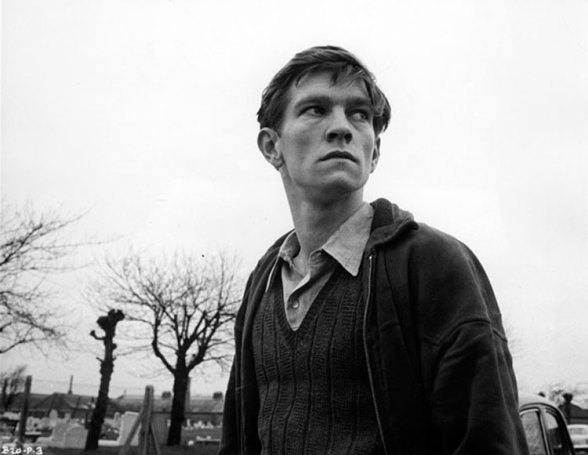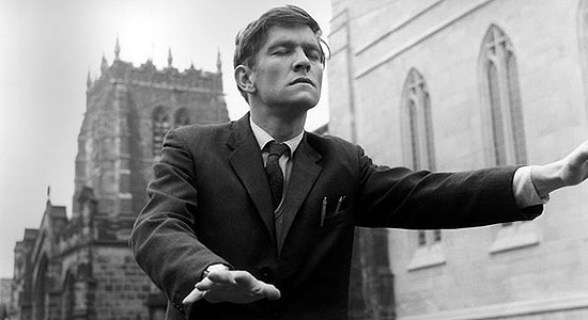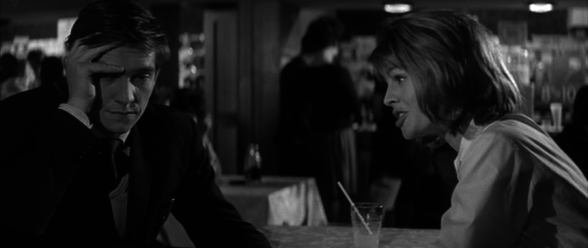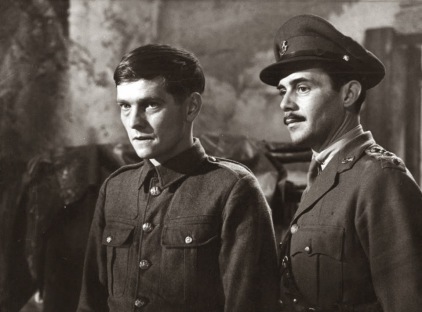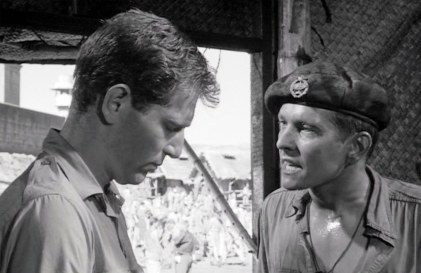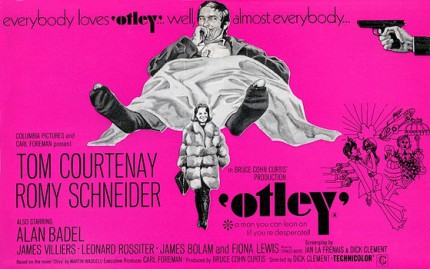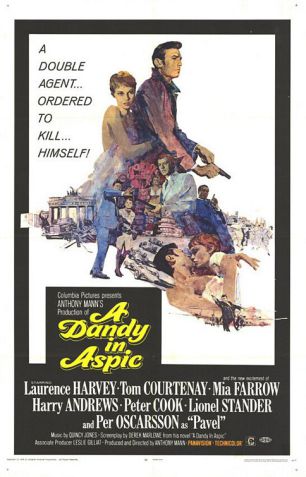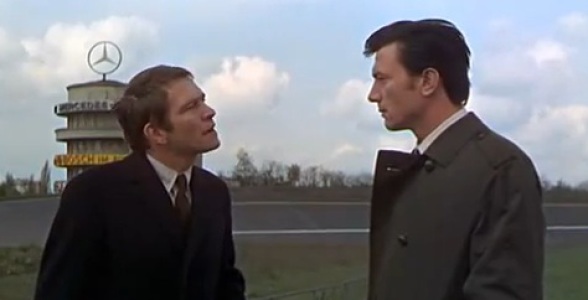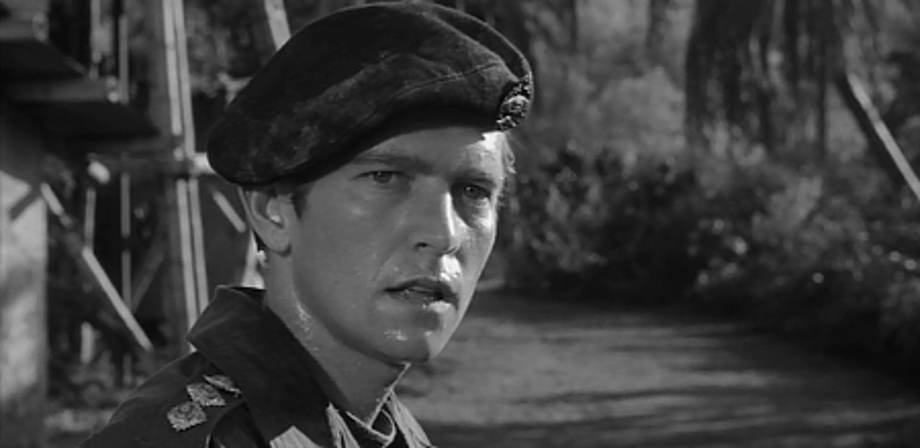
TOM COURTENAY'S 60s FILMS
Tom Courtenay was born in Feb 1937 in Hull into a working class family, and went to school in the city before studying at RADA in London. Although two of his first three film appearances are still his most famous (see below) he is mainly known for his performances on stage, starting at the Old Vic in the early 1960s. He was knighted in 2001. He appeared in roughtly one film a year throughout the 1960s, but had a break from the cinema throughout most of the 1970s and early 1980s, returning in The Dresser in 1983, a role he had again first performed on stage. This page takes a look at some of those 1960s films, including both his famous roles and his not-so-well-known performances.
The Loneliness of the Long Distance Runner (1962)
Althoough Courtenay had appeared as the main character in Private Potter, little seems to be known about this film and I've certainly never seen it or heard of it, so his film debut is generally thought of as this New Wave film directed and produced by Tony Richardson, based on Alan Sillitoe's short story. Courtenay plays Colin Smith, a petty thief who is sent to Borstal but finds that he has a talent for long distance running, and the governor of the Borstal at Ruxton Towers, played by Michael Redgrave, pins his hopes on Smith to win him the challenge cup in the upcoming sports day against Ranley public school, particularly after Smith beats the former blue-eyed boy, Stacy, in a practice run. Smith's progress, or lack of it, at the Borstal is interspersed with flashback scenes, showing how he came to be in the institution (robbing a bakery with his friend, Mike [james Bolam]). This scene for example shows him meeting up with Mike and, after 'borrowing' a car, meeting up with Gladys and Audrey (Julia Foster and Topsy Jane); I was unable to remove the DVD commentary from the clip but on the other hand it does feautre Courtenay himself talking about the role with film historian Robert Murphy, so no harm in having something a bit different:
Courtenay's performance is indeed a triumph, as he portrays the bitterness and pent up anger of youth, railing against the system but in his own, rather more subtle manner. Appearing to be the governor's golden boy, he appears to be about to repay the trust the governor places in him as he returns from his solitary runs and generally keeps his head down; but come the day of the big race, with Audrey (but not his mother) watching on, he throws the race and allows his public school rival (James Fox) to win instead, much to the governor's disgust. (I should just mention however that I don't think much of either lad's running style, particularly Fox's, all flailing arms and head rolling). Richardson's direction came in for some criticism at the time, with some reviewers and commentators drawing attention to various directorial touches borrowed from the French New Wave, and it's true that the occasional speeded up action doesn't work at all, yet at its heart TLOTLDR is a character study, and on that level, thanks to Courtenay, it rermains memorable.
Billy Liar (1963)
Billy Liar was first a novel (by Keith Waterhouse), then a play (with Willis Hall co-writing), then a film, and later even a musical and TV series. It's not always remembered now that when it was first staged it was Albert Finney, not Courtenay, who took the role; but within a matter of weeks of the play opening Finney found himself hot property wtih the release of Saturday Night and Sunday Morning, and he left the play after nine months or so, with Courtenay taking over. He was then a natural choice to play the part when it was filmed, again with Waterhouse and Hall writing the script and John Schlesinger, fresh from A Kind of Loving, directing. If anyone still doesn't know the story, Billy Fisher has an overactive imagination, day dreaming of a fantasy world called Ambrosia where he is the sole ruler, with the everyday world constantly interrupting his reveries. Living at home with his parents and maternal grandmother in what is clearly Bradford (the fictional town of Stradhoughton in the novel) and working in an undertaker's parlour, his life is complicated by various problems that he has largely brought on himself.
In trouble at work due to him failing to send out a batch of the firm's advertising calendars (which he has great trouble getting rid of), in trouble at home due to his general fecklessness (although the distinct impression is given that his father, played by Wilfred Pickles, would find something to moan about regardless), perhaps above all in trouble as he appears to have become engaged to two very different local women, Barbara (Helen Fraser) and Rita (Gwendolyn Watts), and there's the little matter of an engagement ring:
Billy Liar is really a key film of the 1960s, bridging the 'gap' between the 'kitchen sink' (a term I hate) films such as Saturday Night and Sunday Morning and A Taste of Honey on the one hand and 'Swinging London' films on the other, with many people noting that the transition is almost perfectly symbolised by Billy missing out on the train to London whilst Liz (Julie Christe, above) leaves, with Christie herself seemingly personifying the liberated woman in films like Darling, again directed by Schlesinger. And Billy himself? Well, he retreats into his make believe world, probably for ever.
King and Country (1964)
Courtenay then joined forces with Joseph Losey and Dirk Bogarde, fresh from their success with The Servant, in this small-scale adaptation of a play and novel called Hamp, Courtenay's character in the play. The story is straightforward; Private Hamp, three years at the front in the Great War, has deserted by simply walking away from the action, presumably headed for home but with seemingly no real idea of where he is going or what he is going to do when he gets wherever it may be. We first see Bogarde as Captain Charles Hargreaves, who clearly has no sympathy with the man or the case, describing the court-martial as "futile", a "waste of time" and Hamp himself as a "failure as a man and as a soldier". He sums up the situation from his point of view: "If a dog breaks its back, you don't sit around chatting all day, you shoot it." What makes this even worse is that we have already seen Hamp, who is clearly of the view that he will get off and maybe have to spend some time in prison, when it is obvious to all (and certainly to us, the audience) that the most likely outcome is that he will be shot for desertion.
Nevertheless Hargreaves is scrupulously fair, and does his best for Hamp, although the latter doesn't seem to help his cause by his naivety and uncertainty, which is exploited with ease by the prosecuting officer Captain Midgley (James Villiers) as seen in this clip where Hamp gets his turn in the 'witness box':
I read that the film was originally meant to be a TV play, and once you know this it all seems to fit into place. Despite the talent on display (along with Courtenay and Bogarde, Leo McKern, Peter Copley and Barry Foster are amongst the supporting players) the whole production has the look of a 60s TV play, with poor photography (by feature film standards anyway) and annoying still shots of mud filled trenches which serve no particular purpose. The film is a short one at 1 hour 20 mins, but even so scenes of the ordinary soldiers idling their time away, especially a tedious and unamusing sequence where they catch some rats and 'court-martial' one of them, are clearly there as padding, when the whole thing would have been much better as a one hour play. Courtenay turns in a good performance, but he is given a difficult task with the hapless Hamp, and it is Bogarde who stays in the memory as the officer who does his best for Hamp despite his own views.
King Rat (1965)
Much better is another war film, King Rat, but this is another war and another place (a Japanese POW camp in 1945, just before liberation by the Allies), with Courtenay playing Lieutenant Robin Grey, Provost General in the camp who relishes the limited power he has as a strict disciplinarian. The character King Rat refers to Corporal King (George Segal) who plays an American soldier who seems to not have to abide by the rules, or suffer the conditions in the camp; we learn that he has a powerful network of agents, gained through bribery etc, with which he maintains a comfortable lifestyle in the camp, much to Grey's disgust. I was reminded a little bit of Billy Wilder's Stalag 51, where William Holden's character is despised by all and suspected of being a German spy, although nobody seems to think that King is collaborating with the Japanese (he isn't).
The story really centres on the relationship between King and an upper class English RAF officer, Flight Lieutenant Marlow, played by James Fox. Once King notices Marlow speaking Malay, he immediately sees the advantages to be had and with some difficulty persuades him to become part of his network, which Grey has sworn to dismantle, such is his hatred of King. However Grey is that rare beast, a seemingly incorruptible soldier, as this extended sequence (actually two separate scenes in the film) demonstrates:
The film ends in a rather inconclusive manner; as the camp is liberated King's clothing and general condition are noted by the first soldier to arrive at the camp, and he is one of the first to be taken from the camp with some others, without saying goodbye to Marlow, but Grey seems to feel some satisfaction at what he presumes to be King's downfall, but his last speech to Marlow feels artificial and authorial: "It's our turn now Marlow. We're getting even back home too. It was our vote that slung old Churchill and his mob out...It's our turn now."
Otley (1968)
After his role in Doctor Zhivago, and a couple of other films such as Night of the Generals, Courtenay's next appearance was in a little-seen comedy spy drama, Otley, written by Dick Clement and Ian La Frenais and directed (for the first time) by the former. This has not been released officially on DVD, and my copy is of poor quality (probably recorded off the TV many years ago during one of its rare showings), but despite a likeable performance from Courtenay, and lots of character actors flitting in and out, it doesn't amount to much to be honest. Courtenay plays the titular character, Gerald Arthur Otley, a genial rogue who, as the film opens, is evicted from his lodgings whilst owing three months' rent, despite the fact that he is sleeping with the landlady. Hanging around the antique shops and markets, where he well known for his idle ways, he manages to persuade a friend, Lambert (Edward Harwicke) to let him doss down on his couch for the Saturday night; unfortunately, unbeknownst to Otley, Lambert is involved in espionage and is shot that evening by an unknown figure whilst Otley dozes on the couch. He wakes up in a field at Gatwick airport on Monday morning, lost and confused, only to become embroiled in a game of espionage and counter-espionage, unsure who to trust. Eventually he is kidnapped by Johnston (Leonard Rossiter), who reveals that he killed Lambert, and is planning to give up Otley in exchange for a handsome payoff:
The best scene in the film is probably the comedy car chase, as Otley takes his long-awaited driving test with James Cossins playing his driving examiner; the crooks are after him so his driving skills are certainly called into practice, but perhaps not according to the highway code. Amiable though the film is, and it's always good fun to spot the likes of James Bolam, Geoffrey Bayldon, Freddie Jones, Ronald Lacey and James Villiers (and did you spot Robin Askwith and Kenneth Cranham being questioned by the police in the scene above?) there is little else but Courtenay's frustrated demeanour and some good lines holding the film together, and it feels now like another late 60s strange spy drama.
A Dandy in Aspic (1968)
The same could probably be said of A Dandy in Aspic, which has had a DVD release but is possibly even less seen than Otley. Bearing a title which seems to have no relevance to the story, it is a tale - surprise, surprise - of counter-espionage, where nobody is quite who they seem to be and nothing is quite certain. Eberlin (Laurence Harvey) is a British spy, however he is actually working for the Russians under (supposedly) his real name, Krasnevin; therefore when he is given the task of killing Krasnevin this presents something of a problem. Assigned to carry out the assassination in Berlin, he is monitored constantly by Paul Gatiss (Courtenay) who hates Eberlin with a passion. Once in Berlin Eberlin (now known, according to his fake passport, as George Dancer) meets a young, slightly scatty English woman, Caroline (Mia Farrow) who is traipsing around Berlin taking photos with her boyfriend, (played by Richard O'Sullivan, no less) in tow, who doesn't seem to mind her going off with Eberlin and having a brief affair with him.
Gatiss drags Eberlin away from Caroline to do some work, meeting Henderson (John Bird) who he hopes will provide information on who Krasnevin is, but Eberlin acts first, and Gatiss is left to deal wtih Sobakevich (Lionel Stander, known to most of us as Max in 'Hart to Hart') to try and get the information he wants:
Whilst there are some longeurs, and as usual in these types of films things get very confusing (well, they do for me anyway) the story does become more interesting in the second half of the film as we wait to see how Eberlin/Krasnevin is going to get out of his predicament, with a typical 60s cast taking most of the roles (Harry Andrews, Norman Bird, Peter Cook, John Bird, Lionel Stander, Barbara Murray, Mike Pratt and Geoffrey Bayldon all featuring). The film is worth looking out for on TV if it ever comes on again, although if this sort of spy drama is your thing then the DVD can be bought for around £7-8.
There were three more productions for Courtenay before he had a decade long break from the cinema; One Day in the Life of Ivan Denisovich, To Catch a Spy (also written by Clement and La Frenais, and which sounds very similar to Otley and A Dandy in Aspic), and a TV production of 'She Stoops to Conquer'. Whilst some of Courtenay's film choices seem odd now, there may well have been very good reasons to appear in them at the time, and in The Loneliness of the Long Distance Runner and Billy Liar he made his mark which still stands today, with King Rat being my choice for the best of the others.
The pic at the top shows Tom Courtenay as Lieutenant Colonel Robin Grey in King Rat
